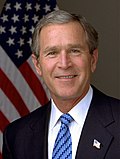References
- 1 2 "Executive Order 13470". Federal Register. National Archives and Records Administration. July 30, 2008. Archived from the original on November 22, 2016. Retrieved November 22, 2016.
- ↑ Strohm, Chris (August 1, 2008). "Bush Orders Intelligence Overhaul". CongressDaily. republished by Nuclear Threat Initiative at NTI.org. Archived from the original on February 24, 2021. Retrieved November 22, 2016.
Intelligence reform in the United States | |
|---|---|
| Legislation |
|
| Commissions |
|
| Committees |
|
| Executive orders | |
| Investigations |
|
| Reports |
|

